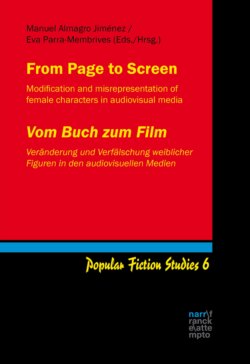Читать книгу From Page to Screen / Vom Buch zum Film - Группа авторов - Страница 25
На сайте Литреса книга снята с продажи.
4.2.2 Adult’s abuses and school mistreatment
ОглавлениеThe previous description epitomizes another pillar of Dahl’s social criticism: adults’ abuse of power and school mistreatment. This is something suffered by other characters apart from Matilda, so this section will describe some relevant examples regarding adults’ misbehavior towards children and how the impact of such conduct leads the main character of the book and her cinematic alter ego to react against them. In both products, the two issues introduced in the heading are once again embodied by Matilda’s parents and Miss Trunchbull.
Mr. and Mrs. Wormwood’s behavior towards Matilda is unbearable for her. She is constantly yelled at and told that she is a liar, an ignorant or a stupid girl when she says something intelligent or when she criticizes her father’s dark business. Regarding Miss Trunchbull, she is the other example of adults’ misbehavior towards children. Actually, Matilda’s parents and Trunchbull have several common aspects in how they treat our protagonist and it is even more emphasized in the film. For instance, at some point the film when her father is angry, he tells Matilda the following words to show her inferiority “I’m smart, you’re dumb. I’m big, you’re little. I’m right, you’re wrong and there is nothing you can do about it” (DeVito et al., De Vito, 1996: 16:16). Similarly, and to make more noticeable for children that they are the antagonists, Miss Trunchbull uses almost the same exact words when she is reprimanding Matilda: “I’m big and you’re small and I’m right and you’re wrong and there is nothing you can do about it” (DeVito et al., De Vito, 1996: 50:18).
As Matilda’s parents, Miss Trunchbull also yells instead of speaking, uses abusive language and acts cruelly with those who contradict her, or just stand in her way. Both in the film and in the book Trunchbull is the protagonist of several passages in which she verbally and physically abuses the children in the school. The most notable examples in the novel are the day when Trunchbull throws a student through the window because he is eating licorice, the day she takes a little girl, Amanda, from her plaits because she does not like them and throws her with such a strength that the girl is sent out over the fence and out of the school premises, or when she lifts another student from his ears because he has given a wrong answer to a question. But maybe the most shocking one is the episode with Bruce Bogtrotter and the chocolate cake. The boy has apparently eaten a piece of cake which was Trunchbull’s. Now, she makes him eat an entire huge chocolate cake in front of all the children in the school. The kids’ reaction and the final outcome of this episode is of paramount importance in the story, and it is further discussed in section 4.2.3.
Even though the film reproduces some of these episodes, Miss Trunchbull’s physical violence against children is slightly modified in some cases or omitted in others in what could be seen as an attempt to adjust the tone of the movie to its potential target audience. An example of the former would be the case of “flying Amanda”, which in the film has a more sugar-coated ending: after she is thrown by Miss Trunchbull, the child lands softly in a flower field. While she is sliding on the flowers, she takes a bunch of them which she lifts up to show her partners that she is fine. As for the omissions mentioned before, the book describes more violent scenes that were not included in the film due to their brutality, a decision that helps prevent the shock numerous aggressions against children could cause in an audience watching a PG rated movie. There are two clear examples that were overlooked in the film that can be found in Dahl’s account when Miss Trunchbull visits Matilda’s classroom. Firstly, she lifts a boy by his hair until he gives the correct answer to a maths question and then lets him go so that he ends up hitting the floor. In the second instance, Miss Trunchbull takes another student and holds him aloft by his ears until he is able to spell a word correctly.
Regardless of whether they affect her or some of her classmates, Matilda’s reaction against the outrages committed by her parents or Miss Trunchbull is always the same. Both in the book and in the film, these abuses spark one of the protagonist’s most distinctive features: her role as an avenger who seeks to punish adults’ misbehavior.
